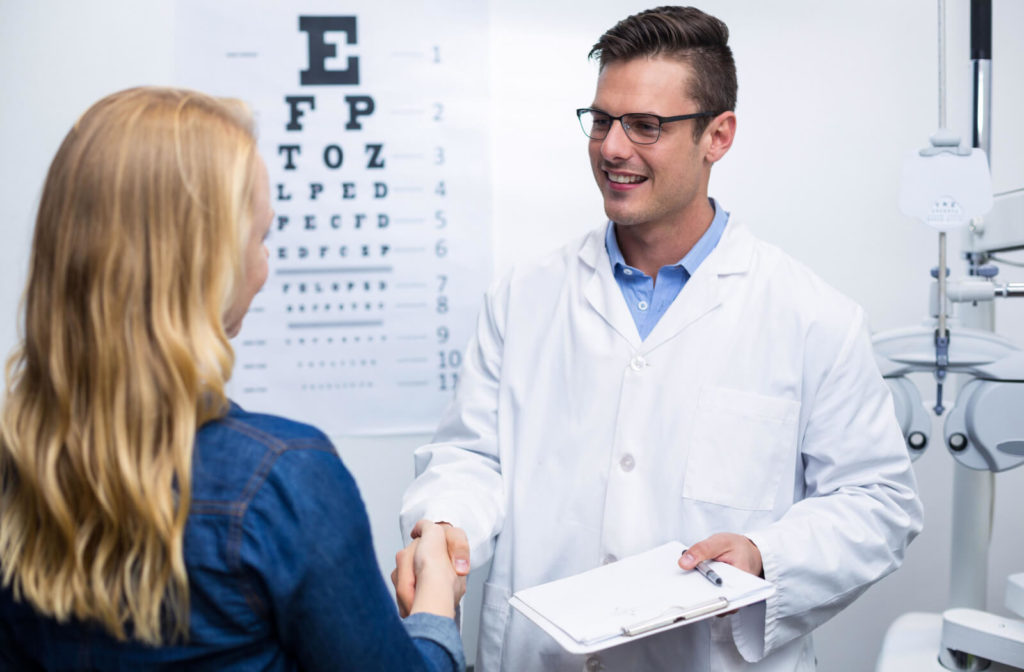We often hear about the importance of staying hydrated for our overall health. Not only does dehydration affect how our bodies function, but it can also cause changes in intraocular pressure (IOP)—but the effect is not super clear. However, dehydration can contribute to other eye problems.
Regular eye exams can help monitor changes in your eyes and help detect and diagnose eye conditions before they progress and affect your vision.
Importance of Hydration for the Eyes
Dehydration is the loss of total body water through sweat, urine, bowel movements, and evaporation from the skin’s surface. You can also lose water from areas of the body not covered by skin, such as the eyes. The human body is more than 60% water, and the human eye is 98% water, primarily in the aqueous and vitreous humors.
The aqueous humor is a water-like fluid found in front of the eye’s lens. It’s constantly being made, absorbed, and drained from the eyes. The vitreous humor is a gel-like substance found behind the lens and in front of the retina (the light-sensitive tissue at the back of the eye) and is primarily responsible for maintaining the eye’s shape.
The balance between the aqueous and vitreous humor helps regulate the volume and pressure of the intraocular fluid. Like any other part of our body, your eyes depend on a delicate balance of fluids to function efficiently. Proper hydration supports tear production, which is crucial for lubricating the eyes and providing comfort.
How Does Dehydration Affect the Eyes?
Dry Eyes
Dehydration can lead to eye dryness. Our eyes can feel dry and irritated when dehydrated, leading to blurry vision. However, dehydration can also cause a slowdown in the production of tears, one of the key factors leading to dry eye disease. Dehydration can lead to thickening of the blood, which reduces blood flow to the eyes and impairs the production of tears.
Spending a lot of time in front of a screen can worsen dry eyes, as we tend to blink less when using screens. To help prevent this, drink plenty of water and take breaks from your screen regularly.
Lens Problems
Dehydration can cause problems with the lens of the eye. Our lenses are mostly made up of water, and when we’re dehydrated, they can become less flexible, leading to difficulty focusing, which can cause problems with reading and other close-up activities. If you’re experiencing this vision problem, try drinking more water and taking a break from close-up activities.
Aesthetic Issues
Dehydration can cause the tissues around our eyes to shrink, leading to a sunken appearance. This not only affects our appearance but can also cause problems with vision.
Long-Term Damage
When we don’t drink enough water, the tissues in our eyes can become damaged, leading to increased vision problems over time, including issues with the retina and the optic nerve.
Tips for Maintaining Proper Hydration
A healthy daily fluid intake can differ for men and women: 124 ounces for men and 92 ounces for women. Here are some tips to maintain adequate hydration for eye health:
- Divide your weight (pounds) by 2 to find the number of ounces you should drink daily.
- Stay hydrated throughout the day.
- Set reminders to drink water.
- Drink first thing in the morning and before every meal.
- Make water more appealing by adding flavor, like lemon.
- Don’t ignore cues, such as dry mouth or thirst sensations.
- Monitor your urine color. Dark urine is a sign of dehydration.
- Eat hydrating foods like watermelon, cucumber, and oranges.
- Limit dehydrating substances, such as caffeine and alcohol.
- Avoid medication that causes dehydration side effects.
- Use lubricating eye drops or artificial tears to prevent dry eyes.

Keep Hydrated to Support Your Long-Term Eye Health
Proper hydration is good for your body, eyes, and overall health, and seeing your eye doctor for regular eye exams can protect your eyes and help you maintain healthy vision for years.
Book an appointment with Total Vision Sports Arena to assess your eye health and catch problems early.



